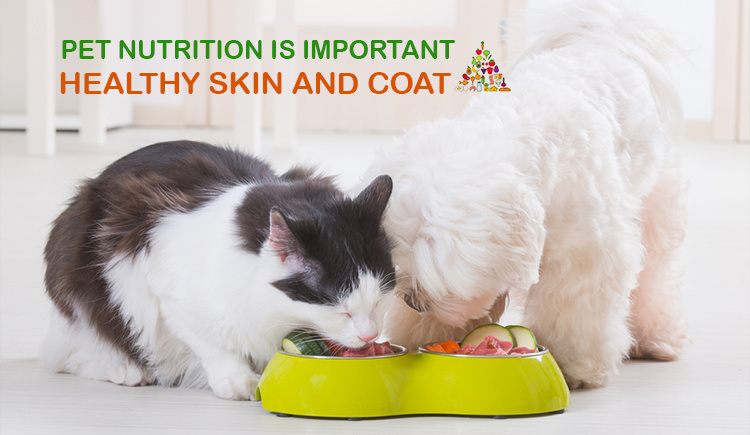There are numerous pet food companies that promote their brand of cat or dog food for a healthy coat, but how do you know which one will provide the best nutrients for your pet? You want to provide your dog or cat food that will help them thrive as a responsible pet parent. Looking for a few important features on a pet food label may help you determine whether the meal you choose promises a specific benefit, but choosing a dog or cat food for a healthy coat isn’t the only approach to ensure your pet’s skin and coat are in good condition. Learn how nutrition, environmental variables, and grooming may all contribute to your pet’s appearance and well-being.

Do you want to find the perfect food?
Maybe your dog or cat already has sensitive or itchy skin, or maybe you want to switch to a meal that promotes overall excellent health, including skin and fur. Whatever the rationale, avoid focusing on just one or two important ingredients or needs. For a healthy coat, some pet parents search for high-fat content in cat or dog food. Although nutrients such as fish oil are commonly used in promoting cat food for a healthy coat, your furry pet still requires a balanced balance of vitamins, minerals, protein, and carbohydrates. The truth is that most cats and dogs are already protected from skin and coat issues by eating a well-balanced diet. Beauty truly begins on the inside.
If you make it a habit to read the ingredient and nutrient profiles on your pet’s food bag or can, these are some of the more prevalent nutrients that support healthy skin and coats in pets:
- Omega-3: This nutrient, which is commonly found in components such as fish oil, has an anti-inflammatory impact and can help soothe itchy or inflamed skin. This component is commonly seen in pet diets designed for allergy-prone dogs.
- Omega-6: This nutrient is a fatty acid that helps your pet’s coat shine and replaces important oils in their skin.
- Biotin: It is a B-complex vitamin that aids in the formation of healthy tissues.
- Copper: This nutrient aids in the maintenance of hair color and keeps the coat silky and lustrous.
- Vitamin E: It is a natural antioxidant that helps protect your pet’s skin from free radicals that can damage skin cells.
However, if you’ve been feeding your pet high-quality food with a balanced nutrient profile and you’re still noticing dry skin, dandruff flakes, or dull-looking fur, it’s time to consult your veterinarian. Your pet’s food or components may need to be changed. Remember, never make any modifications without first consulting with your veterinarian.
The first thing to look for in a pet food to encourage healthy skin and coat is one manufactured with high-quality ingredients and that provides comprehensive balanced nutrition. This alone can contribute to a more luscious, luster-filled coat. If your pet is scratching excessively or has recurrent skin problems, it’s a good idea to consult with your veterinarian to discuss the next steps. They can assist in determining the source of the itch and recommending a meal made for sensitive skin or even a therapeutic food specially formulated to encourage healthier skin and coats.
What Is the Appearance of a Healthy Coat?
What indicators of a healthy coat should you look for? To begin, you need to become acquainted with your pet’s distinct qualities. For both cats and dogs, perform a daily head-to-paws check and brush your pet at least once a week. Brushing dogs more frequently (even daily) helps disperse natural oils throughout the coat and untangle mats. Cats (and your carpet) benefit from fewer hairballs and more snuggle time when they are groomed.
Cats are avid self-groomers, so an unruly coat could indicate that your kitten isn’t feeling well. Arthritis may prohibit your cat from combing some areas, and a dull, greasy, or matted hair may indicate health issues or a lack of key nutrients. A worried cat may also over-groom, yanking away tufts of her own fur.
Because your dog does not bathe as frequently, he or she may require a bit extra assistance to look well-groomed. What is usual for one breed may not be normal for another; a husky may require daily brushing, but your dachshund may be pleased with a fast bath. Dogs with thinner, lighter-colored skin, such as pit bull mixes, are more prone to skin irritations such as sunburn, bug bites, and seasonal allergies. If you have a lovable mutt, reviewing some short and long hair care standards might help you set a baseline.
Keep an eye out for the following when brushing your cat or dog:
- Bald patches or clumps of fur going out
- Skin that is dry, red, or irritating
- Sores or rough patches
- Greasiness
- Ticks or flea eggs in the form of little black or white flecks
If none of these items develop, your pet’s coat is most likely healthy. However, if you see any of these symptoms, it’s important to dig deeper to find out what’s causing your pet’s coat problems.
Is it still a mystery? Consult with Your Vet
If you observe your cat scratching their ears or your dog licking themselves continuously, it’s probable that something in their environment is causing the irritation. Fleas and ticks, as well as seasonal allergies and food intolerance, are major causes of itching pets. As soon as the itching begins, make a list of any new cleaning products, air fresheners, colognes, or soaps that have been introduced into your home and may be bothering your pet.
Your veterinarian will be able to assess the state of your pet’s coat and skin to determine whether additional testing is required. Skin problems caused by an infection or fungus may necessitate the use of drugs and/or specific shampoos.
Further Reading
If your veterinarian has ruled out all other possibilities, they may advise you to go over the ingredients in your pet’s current and previous foods. They may advise you to provide a particular diet to your pet to see if he or she has a food allergy, or to supplement your pet’s nutrition with a deficient vitamin, antioxidant, or fatty acid. As nutrition is essential for skin and coat health, it’s important to keep your dog or cat on any special diets your vet suggests. Even if the disease improves, do not resume eating other foods without first consulting with your veterinarian. Don’t waste months or years looking for the best dog food for a healthy coat; instead, take your pet to the vet as soon as possible and on a regular basis to address any skin and coat issues. You are the beginning of your pet’s healthy future, both inside and out. You can keep your dog or cat’s coat and skin healthy and vibrant for years with correct feeding, grooming, and frequent vet checkups.

